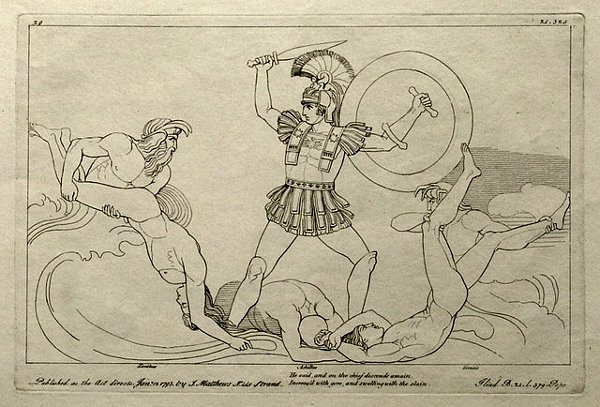
Paul McCartney never learned to read music. “I don’t have any desire to learn,” he said. “I feel it’s like a voodoo, that it would spoil things if I actually learnt how things are done.”

Paul McCartney never learned to read music. “I don’t have any desire to learn,” he said. “I feel it’s like a voodoo, that it would spoil things if I actually learnt how things are done.”

Achillize
v. to harass or chase in a manner reminiscent of Achilles
Brad Pitt, who played Achilles in the 2004 film Troy, tore his Achilles tendon during production.

“If scientific theories are correct it is more of an honor to lose at chess than win,” mused Edgar Rice Burroughs in his diary on Jan. 3, 1921. “I do not recall ever having lost a chess game — though I have played but few times.”
Perhaps inspired, he invented a Martian variant of the game, Jetan, for his novel The Chessmen of Mars, published the following spring. Played with alien pieces on a 10×10 board, the game underlies a climactic scene in which living players fight to the death on an oversize board.
A few months after the novel’s appearance, Burroughs received a letter from Elston B. Sweet, a convict at Leavenworth, who with a fellow prisoner had carved a full set of pieces for Jetan. “We have not only played dozens of games between us,” he wrote, “but have succeeded in making the game a favorite among several other prisoners.” When other readers expressed similar interest, Burroughs summarized the rules of the game in an appendix to the novel.
In a 1968 collection of chess variations, John Gollon praises Jetan as “quite good — very playable and entertaining.” He includes this sample game between himself (orange) and J. Miller (black):
1. (T) A2-B4 (T)A9-B7
2. (W) A1-A3 (W) A10-A8
3. (Pd) B1-B3 (Pd) B10-B8
4. (Pa) C2-D3 (Pa) C9-D8
5. (D) C1-C4 (D) C10-C7
6. (O) G1-D4 (O) G10-D7
7. (D) C4-C7X (D) (Pa)D8-C7X (D)
8. (Pa) B3-D5 (O) D7-G8
9. (Pa) D5-B7X (T) (Pa) C7-B7X (Pd)
10. (O) D4-G5 (Pa) F7-F8
11. (Pa) H2-G3 (Pa) H9-I8
12. (D) H1-H4 (D) H10-H7
13. (Pd) I1-I3 (Pa) I7-J8
14. (T) J2-I4 (C) F10-F7
15. (D) H4-H7X (D) (Pa) I8-H7X (D)
16. (Pa) E2-E3 (O) D10-G7
17. (Pd) I3-I5 (O) G7-D6
18. (O) D1-E4 (O) D6-G5X (O)
19. (T) I4-G5X (O) (C) F7-I5X (Pd)
20. (Pa) G3-G4 (C) I5-I2X (Pa)
21. (P) F1-C1 (C) I2-J1X (W)
22. (T) G5-H7X (Pa) (O) G8-H7X (T)
23. (O) E4-H7X (O) (P) E10-C9
24. (O) H7-I10X (Pd) (T) I9-I7
25. (C) E1-E4 (W) J10-I9
26. (C) E4-D7 (P) C9-F1
27. (C) D7-F4
“Black’s Princess ‘escaped’ into certain capture — no matter where she moves, she will be taken.”
New Jersey magician Karl Fulves invented this ESP trick. Hand a friend an ordinary die and turn your back. Ask her to place the die on a table. Now ask her to give the die a quarter turn: If the top number is even, she must turn it to the east (to her right), and if the top number is odd, she must turn it north (away from her). This exposes a new top number, and she can turn the die again according to the same rule, turning it east if the number is even and north if it’s odd. After she has continued in this way for several turns, you ask her to stop when the top number is 1, then to give the die one final turn and to concentrate on the top number. It would seem as though the final number might be any one of four possibilities, but you can name it correctly with your back turned. How?
A magician asks you to shuffle a pack of cards and to take some quantity of them. He takes a larger packet for himself. The magician counts his cards and says, “I have as many cards as you have, plus four cards, and enough left to make 16.”
You count your cards and find that you have 11. The magician counts 11 of his cards onto the table, sets aside a further four, and then continues counting: 12-13-14-15-16. The 16th card is the last, as he predicted.
He can repeat the feat as often as you request it. The number of cards that he sets aside sometimes varies, but he always arrives at the predicted quantity. How does he do it?
Fred Astaire composed a unique dance solo for 1951’s Royal Wedding — he celebrates his love for Sarah Churchill by dancing on the walls and ceiling of his hotel room.
The effect was produced by situating the entire room in a steel-reinforced cylindrical chamber 20 feet in diameter, which the crew could turn as Astaire danced. Cameraman Robert Planck was strapped to a board that rotated with the set, producing the illusion that the room was stationary and that the dancer was freed from gravity.
The details required further trickery. “Fred’s coat was sewed to the chair, and the chair was screwed to the floor,” remembered director Stanley Donen. The photograph that Astaire admires is fitted with magnets. “The draperies were made of wood. There’s nothing soft in the shot. There was only one cut during the sequence — while he is at midpoint on the wall, necessitated by having to change the roll of film. We rehearsed this [scene] for weeks and filmed it in one morning. … We were literally through with the entire sequence by lunch.”
When Steven Spielberg dropped out of college in 1968, he was only a few credits short of a diploma.
So in 2002, after winning three Oscars, five honorary doctorates, and two lifetime achievement awards, he returned to California State University, Long Beach, to complete a degree in film and electronic arts.
He placed out of FEA 309, the advanced filmmaking class. To demonstrate his proficiency, he submitted Schindler’s List.
Letter from Eddie Cantor to Groucho Marx, Jan. 9, 1964:
Dear Julius,
Since being inactive as a performer I’ve done quite a bit of scribbling. This is my fourth year writing a column for Diners’ Club Magazine.
Will you please send me as quick as you can two lines which have brought you the biggest laughs. I would appreciate it for my next column.
Gratefully,
Eddie
Groucho responded:
Dear Eddie:
Briefly (and quickly) the two biggest laughs that I can recall (other than my three marriages) were in a vaudeville act called “Home Again.”
One was when Zeppo came out from the wings and announced, ‘Dad, the garbage man is here.’ I replied, ‘Tell him we don’t want any.’
The other was when Chico shook hands with me and said, ‘I would like to say good-bye to your wife,’ and I said, ‘Who wouldn’t?’
Take care of yourself.
Regards,
Groucho Marx
Swimming in the Nile at age 10, Hadji Ali discovered he could ingest large amounts of water and bring it up again without ill effect. He parlayed this talent into a career as a “regurgitation act” in music halls and carnivals around the world, playing even to Tsar Nicholas II at the Winter Palace in 1914.
The performance above, from Laurel and Hardy’s 1931 Spanish-language film Politiquerias, includes Ali’s famous closing stunt, in which he ingests both water and kerosene and then upchucks them variously onto an open flame.
All of this was received with surprising tolerance by the era’s audiences — Judy Garland named Ali her favorite vaudevillian — but at least one club cut short an engagement when they found it was “killing their supper shows.”

In 1947, Charles M. Schulz was working as an art instructor at a Minneapolis correspondence school when the accounting department hired a pretty redhead named Donna Mae Johnson. “I just thought she was wonderful,” Schulz said. On his way in to work he would stop off on the second floor to draw cartoons on her desk calendar, and in February 1950 they began to date.
The trouble was that Donna had a second boyfriend, a local boy named Alan Wold whom she had been dating since 1948. “I knew quite soon in the relationship that it was Al that I wanted,” she said, yet “I really loved Sparky too at the same time.” She asked her diary on May 8, 1950: “How will you ever decide?”
On June 14, after signing a deal with a newspaper syndicate to publish his comic strip, Peanuts, Schulz went to her and proposed marriage.
All she could say was “I don’t want to marry anybody. I just wish everybody would leave me alone.”
He pressed her for three weeks, but she was firm. Schulz eventually moved to Colorado, married Joyce Halverson, and started a family, but he kept in touch with Donna for the rest of his life. One night he grew sentimental listening to Joni James sing about unrequited love, “and that was the mindset that got me going on Charlie Brown sitting at the playground, eating his lunch, and he looks across the playground, and he sees the little red-haired girl, and from that, that whole series came, one thing after another.”
“You never do get over your first love,” he said at age 75. “The whole of you is rejected when a woman says, ‘You’re not worth it.'”